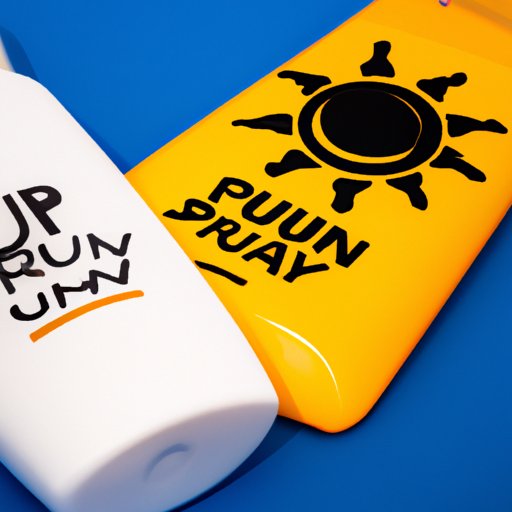Introduction: What is Sunscreen and Why is it Important?
Sunscreen – also known as suntan lotion, sunblock, sun cream, or block out – is a product applied to the skin to protect against ultraviolet (UV) radiation from the sun. It is an essential part of any individual’s skincare routine, especially during summer months when the sun is at its strongest. Sunscreen is important for protecting against sunburn, skin damage, and even skin cancer caused by prolonged exposure to UV radiation.
According to the Skin Cancer Foundation, “Skin cancer is the most common form of cancer in the United States. In fact, more than 3.5 million cases of basal and squamous cell skin cancer are diagnosed each year.” The Foundation also notes that “Melanoma, the deadliest type of skin cancer, affects one in five Americans in their lifetime.” Sunscreen is an essential tool in preventing the occurrence of skin cancer and other types of skin damage.
Explaining the Science Behind Sunscreen: How it Works and Why It’s Important
To understand why sunscreen is so important for skin protection, it is important to first understand the science behind UV radiation and its effects on skin. UV radiation is divided into three categories – UVA, UVB, and UVC – based on their wavelengths. UVA and UVB radiation are the two forms of UV radiation that reach the earth’s surface, and both have been linked to various skin issues including premature aging, sunburn, and skin cancer.
Sunscreens work by absorbing, reflecting, and scattering UV radiation from the sun. They contain ingredients – such as zinc oxide, titanium dioxide, and avobenzone – that absorb UV radiation and convert it into heat, which is then released from the skin. Sunscreens also contain reflective particles that reflect UV radiation away from the skin. These reflective particles are usually made of metal oxides, such as zinc oxide or titanium dioxide.
The effectiveness of sunscreen is measured using the Sun Protection Factor (SPF). The SPF number indicates how much longer you can stay in the sun without getting sunburned compared to not wearing sunscreen at all. For example, if you normally burn after 10 minutes in the sun, wearing an SPF 30 sunscreen would give you 30 times longer in the sun before burning – or 300 minutes of protection.
Choosing the Right Sunscreen
When it comes to choosing the right sunscreen for your needs, there are a few factors to consider. First, look for a sunscreen with broad-spectrum coverage, meaning it will protect against both UVA and UVB radiation. Sunscreens that are labeled “Broad Spectrum SPF” provide this type of protection. Second, consider the SPF number. Generally, it is recommended to use a sunscreen with an SPF of 30 or higher. Third, look for water-resistant sunscreens if you plan to be in and around water.
There are many different types of sunscreens available on the market today, including lotions, creams, gels, sprays, and sticks. Lotions and creams are typically best for normal and dry skin, while gels are better for oily skin. Sprays and sticks are great for hard-to-reach places and quick touch-ups. It is also important to note that some sunscreens contain ingredients that may irritate sensitive skin, so it is always best to read the label carefully and choose a product specifically designed for sensitive skin.

Applying Sunscreen Properly and Maximizing Its Effectiveness
It is important to apply sunscreen properly to ensure maximum protection. To do this, apply an adequate amount of sunscreen – about a teaspoon for the face and neck, and a shot glass-sized amount for the body – and spread it evenly over all exposed areas of skin. Be sure to cover all areas that will be exposed to the sun, including ears, nose, lips, scalp, hands, and feet. It is also important to reapply sunscreen every two hours, or more often if you are sweating or swimming.
In addition to using sunscreen, there are other ways to protect yourself from UV radiation. Wearing protective clothing, such as hats, long-sleeved shirts, and sunglasses, can help reduce your exposure to UV radiation. Seeking shade when possible is also a good way to limit your exposure to the sun.

Conclusion: Summary of Sunscreen Benefits and Use
Sunscreen is an essential part of any skincare routine, providing protection from UV radiation and reducing the risk of skin cancer, sunburn, and other types of skin damage. When used correctly, sunscreen can help keep your skin healthy and looking great. To maximize its effectiveness, it is important to choose the right sunscreen for your skin type and apply it properly. Remember to reapply sunscreen every two hours, or more often if you are sweating or swimming.
We all need to take steps to protect our skin from UV radiation, and using sunscreen is an important part of this process. So make sure to grab some sunscreen and start protecting your skin today!
Call to Action for Sunscreen Protection
Don’t forget to lather up with sunscreen before heading out into the sun this summer! Protect your skin from sunburn and other types of skin damage by choosing the right sunscreen for you and applying it properly. Together, we can all make sure to take the necessary steps to protect our skin from UV radiation and its damaging effects.
(Note: Is this article not meeting your expectations? Do you have knowledge or insights to share? Unlock new opportunities and expand your reach by joining our authors team. Click Registration to join us and share your expertise with our readers.)
